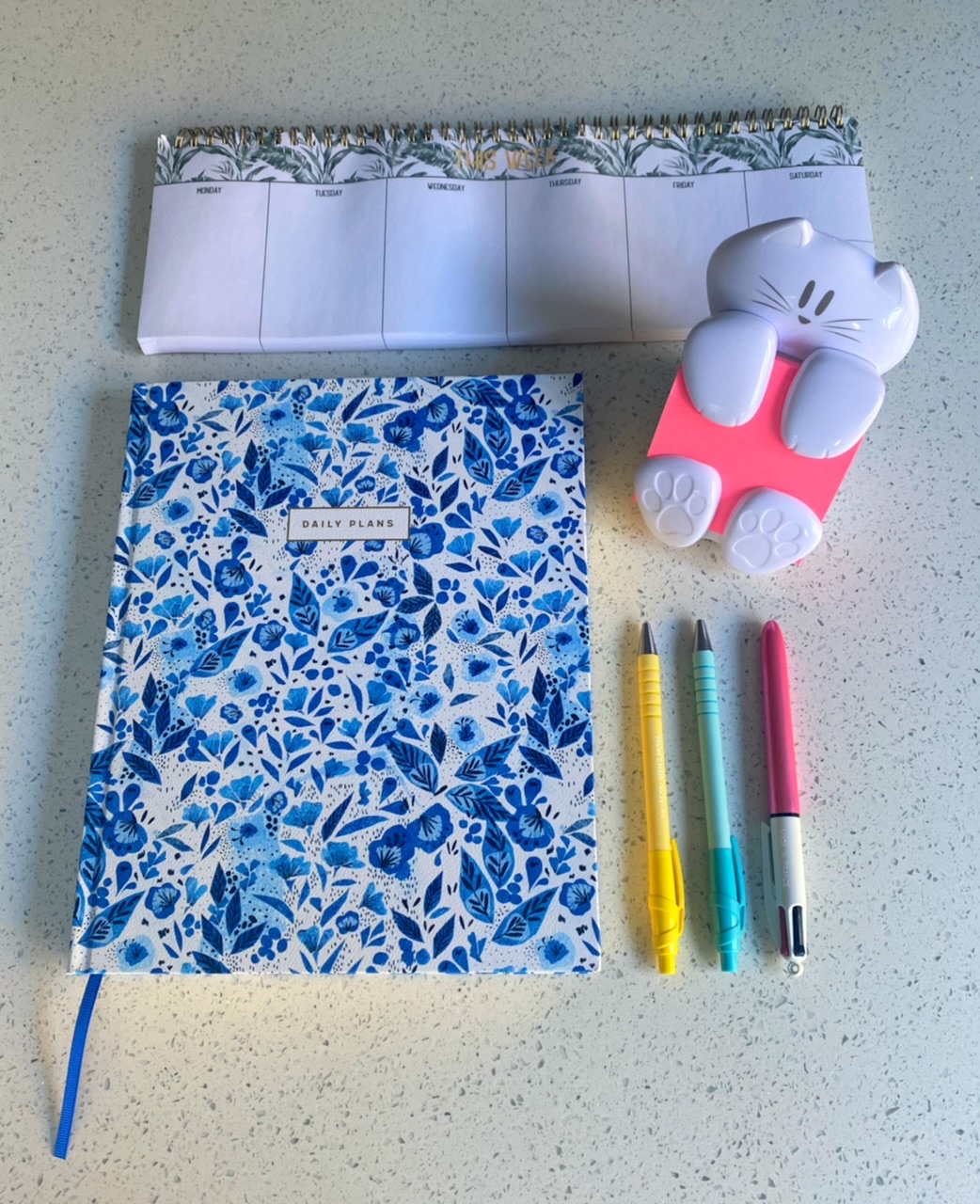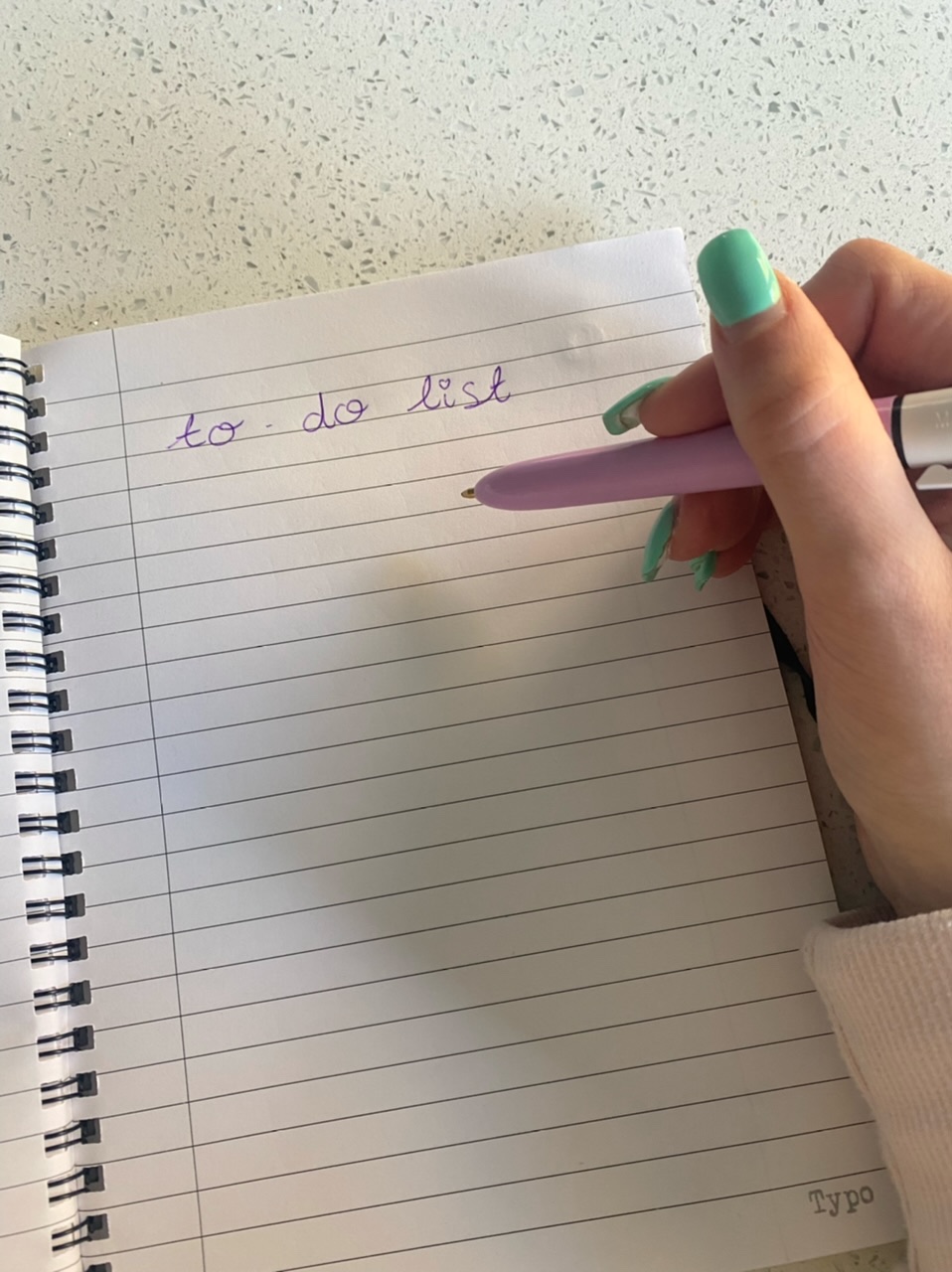You know that moment when you open your eyes, and blearily reach to turn your alarm off, only to realise that you never set it in the first place and you now have 10 minutes to get ready? Yeah, that’s not fun. Especially when you’re on placement year and don’t have the luxury of recorded lectures to save you…!

So that’s the bad news. The good news, though, is that it doesn’t have to be this way. In this blog, I’ll be sharing some tips to help you stay organised and keep that ‘oops I overslept’ horror at bay…
~
Tip 1) Planning is your best friend, especially if it’s visual and not just mental
Let’s face it, 21st century life is hectic, and it can sometimes feel like you have a million and one things to do. Unless you have a photographic memory, or are just some kind of mental planning genius, it’s unlikely that you’ll be able to remember everything on your to-do list without some kind of visual reminder.
This is where writing things down can really come in handy (pardon the pun!). You don’t have to splurge on lots of fancy stationery to achieve this, either; the Reminders section on your phone can be a great way to keep on top of tasks. Although if you’re like me you probably will end up getting carried away in your local Paperchase! (See evidence below)

Regardless of how creative you want to get with your to-do lists, the number one thing I have found helped me is being specific in my goals. If you have a work deadline coming up, it’s probably not going to be a great deal of help simply planning to ‘write a report’. Plus, making your aims overly general can sometimes cause unnecessary stress by making it seem like a mammoth task. When you don’t even know where to start with something, good old procrastination starts to rear its head.
So, how to be more specific in your planning? Here’s where I’m going to risk sounding like a university tutor, but setting SMART objectives can be a great way to make your tasks seem more manageable. You may have come across these before at school or uni, but for those of you who aren’t familiar with the acronym, here’s a quick breakdown:
Specific – Plan the precise, individual things that are required to achieve the task
Measurable – Consider how you can measure your progress on the task
Achievable – Keep things challenging, but within the limits of your resources
Realistic – Remember the bigger picture; focus on getting things done and try not to obsess over meeting exceptionally high standards
Time-bound – Set yourself a timeframe to work on your task(s)
So, using the example of writing a work report, your objective may look something like:
‘Starting on Monday at 9am, I am going to write a bullet point draft of all the things I need to include in my report. I aim to get this done within half an hour.’
Of course, you can build upon your objectives as you work through the specific elements. I personally find that breaking down my tasks into manageable chunks helps keep me motivated and prevents feeling overwhelmed. Turns out the university tutors were right!!
2) Communication + cooperation = 10/10 organisation
Even though placement is a great opportunity to be more independent and work on your self-management skills, it can still be useful to reach out to your colleagues for help organising things. For instance, talking to your manager or other senior staff about your responsibilities and what is expected from you can help you feel more confident in your role, allowing you to organise yourself properly. It also shows you are motivated and interested in the work, helping you to make a good impression.
If like me you are not the only placement student at your workplace, you may find you need to organise things together. This is another situation where communication can have a positive impact on your ability to plan. For example, if you are presenting at a team meeting on a collaborative project, you may need to organise yourselves into different research, speaking and presenting roles. (This is another situation where setting SMART objectives, this time in a group setting, could be useful). A lot of this probably sounds like common sense, but it can sometimes be daunting to talk to new people, especially when you are starting a new job. So, take some inspiration from Albert Einstein, who reminds us that “The important thing is never to stop questioning.”

3) Tidy space, tidy mind
It can be difficult to organise yourself at the best of times, but chances are if you’re surrounded by empty coffee cups and random bits of paper it’ll be significantly harder.

Credit: Pixabay, pexels.com
Having a tidy workspace can really make a world of difference to your levels of organisation and motivation. Don’t believe me? There’s science to back this up (I’m a Psychology student, I’d never state anything without evidence!). Neuroimaging studies have found that the more clutter is visible in your immediate environment, the higher the likelihood of distraction and procrastination. This is because the part of your brain responsible for processing visual stimuli only has a limited capacity, so it can easily get overwhelmed when faced with a load of mess. In other words, you’re unlikely to be focusing all your attention on writing that really important work report when surrounded by a sea of ‘stuff’. Bottom line - clean your desk and turn off your Snapchat notifications!!

Credit: Ken Tomita, pexels.com
4) Know your limits
Just like our visual processing system is limited, so too is our physical and psychological capacity in general. Nobody is superhuman, and the fatigue caused by burnout isn’t worth the stress of trying to complete a hundred things in one day. The fact that burnout is now recognised as a psychological syndrome, combined with stats that the average employee takes around 18 days off per year due to stress, reflects how easy it is to fall into the trap of overloading yourself.
In fact, you’re more likely to get less done if you’re trying to do an unrealistic amount of work, because the failure to meet impossibly high standards only serves to drain and demotivate. Unsurprisingly, this doesn’t make for the best organisation skills.

Credit: Pixabay, pexels.com
The upshot of this is that it can be sensible to delegate tasks to make life more manageable and lead to better performance in the long-run (although be sure to check with your manager first before you start altering your work schedule!!). We’re constantly told how important it is to look after our mental well-being, and the workplace is no exception.
If you really feel that you are struggling with workload and burnout on placement, don’t be afraid to reach out to your placement supervisor for support and advice. Remember that even though you are on placement, you remain a registered student at the Uni, so the Wellbeing Services are still available to help you with a whole host of matters surrounding your health and happiness. More specifically, your placement supervisor and personal tutor are on call to support you with any personal and work-related concerns.
On a general level, there’s a ton of online self-help resources available to help you manage your wellbeing (for some ideas, check out the links at the end of this post). I am doing my placement with the mental health charity ‘Mind’, so it would be silly for me not to highlight them as a great resource for wellbeing support!
In much the same way that a tidy space leads to a tidy mind, a healthy mind leads to a healthy life, so remember to give yourself the self-care that you deserve.

5) Reflect on the effect
Everybody is different, so certain strategies for keeping organised may work for some people but not others. There’s no one-size-fits-all approach to organisation; it can be good to take a step back now and again to reflect on whether your current methods are working, then make changes accordingly. For example, you may have been making lists on your phone but found that you kept getting distracted by other apps in the process. If this is the case, you could consider making written notes on paper, instead. Or, perhaps you were planning your days in the evening when you were too tired to remember everything, so you could switch to doing this first thing in the morning before the day’s distractions get in the way. You wouldn’t keep wearing a top that doesn’t suit you, so why hold on to an organisation routine that doesn’t suit you? It’s all about tailoring the fit.

Plus, reflection is a highly important skill that can extend far beyond matters of organisation. Ultimately, your placement is a chance for you to constantly reflect on your progress and growth as a person, so incorporating reflection into your daily life can be a great way to start fine-tuning this ability.
~
I hope you found this blog useful! 😊 Let me know in the comments if you tried any of the tips and if they worked for you.
Resources to help with stress and burnout:
https://www.nhs.uk/mental-health/self-help/guides-tools-and-activities/tips-to-reduce-stress/
https://www.mind.org.uk/media-a/4667/how-to-manage-stress_2015.pdf
https://www.mentalhealth.org.uk/publications/how-manage-and-reduce-stress
https://positivepsychology.com/stress-management-techniques-tips-burn-out/ (see in particular the section on ‘Stress Management In The Workplace’)
Respond